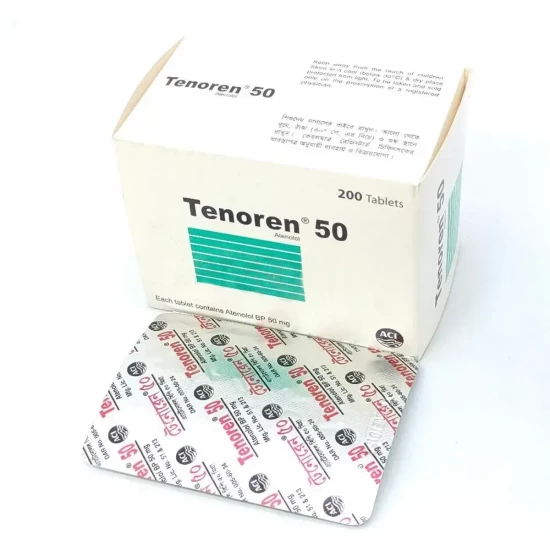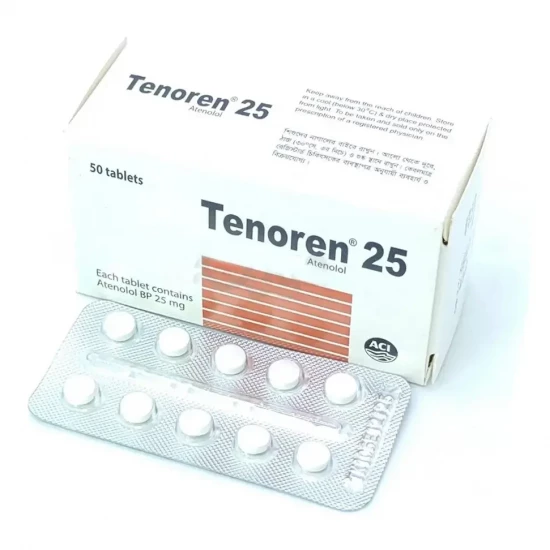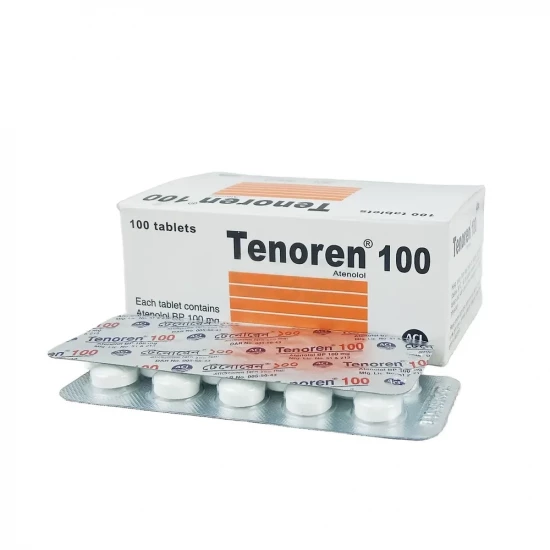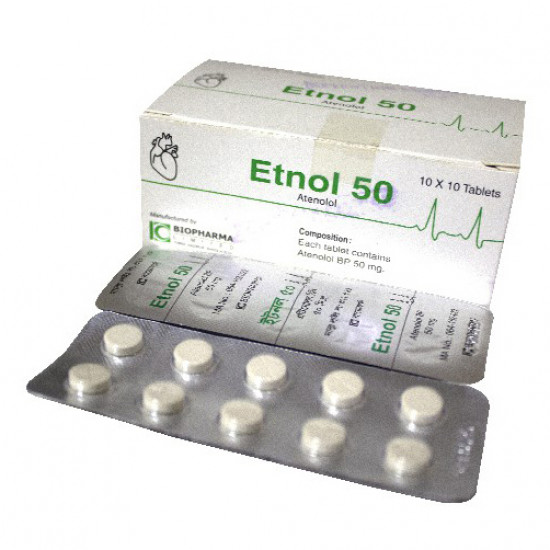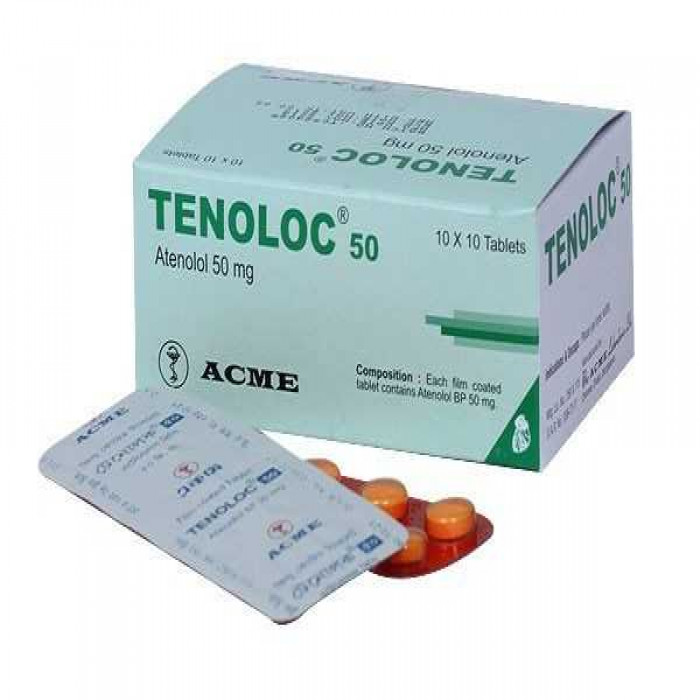
✔ 100% Authentic Product
👁️ Currently Viewing 2616
Tablet Manufacturer/Distributor: Acme Specialized Pharmaceuticals Ltd. Generic Name: Atenolol 50 mg Tablet
Discount
Price: ৳ 8
MRP:
৳
8
5%
Off

100% Genuine Products, Guaranteed

Safe & Secure Payments, Always

Fast, Secure & Efficient Delivery

Proper Packaging
 Cash on Delivery - All over Bangladesh
Cash on Delivery - All over Bangladesh Regular Delivery - 12-24 Hours, Dhaka City* Charge Tk.39-59
Regular Delivery - 12-24 Hours, Dhaka City* Charge Tk.39-59 Regular Delivery - 24-48 Hours, Other Cities* Charge Tk.99-110
Regular Delivery - 24-48 Hours, Other Cities* Charge Tk.99-110
🌙 রমযান অফার 🌙
 ফ্রি ডেলিভারিঃ - ৭৯৯ টাকা+ অর্ডারে, ঢাকা
শহরে
ফ্রি ডেলিভারিঃ - ৭৯৯ টাকা+ অর্ডারে, ঢাকা
শহরে ফ্রি ডেলিভারিঃ - ২৭৯৯ টাকা+ অর্ডারে, ঢাকার
বাহিরে
ফ্রি ডেলিভারিঃ - ২৭৯৯ টাকা+ অর্ডারে, ঢাকার
বাহিরে
📲 মোবাইল অ্যাপ অর্ডারে সাশ্রয় বেশী
-
Google Play Store থেকে ডাউনলোড
-
Apple Store থেকে ডাউনলোড
100% Genuine Products, Guaranteed
Safe & Secure Payments, Always
Fast, Secure & Efficient Delivery
Proper Packaging
 Cash on Delivery - All over Bangladesh
Cash on Delivery - All over Bangladesh Regular Delivery - 12-24 Hours, Dhaka City* Charge Tk.39-59
Regular Delivery - 12-24 Hours, Dhaka City* Charge Tk.39-59 Regular Delivery - 24-48 Hours, Other Cities* Charge Tk.99-110
Regular Delivery - 24-48 Hours, Other Cities* Charge Tk.99-110 ফ্রি ডেলিভারিঃ - ৭৯৯ টাকা+ অর্ডারে, ঢাকা
শহরে
ফ্রি ডেলিভারিঃ - ৭৯৯ টাকা+ অর্ডারে, ঢাকা
শহরে ফ্রি ডেলিভারিঃ - ২৭৯৯ টাকা+ অর্ডারে, ঢাকার
বাহিরে
ফ্রি ডেলিভারিঃ - ২৭৯৯ টাকা+ অর্ডারে, ঢাকার
বাহিরে- Google Play Store থেকে ডাউনলোড
- Apple Store থেকে ডাউনলোড
🌙 রমযান অফার 🌙
📲 মোবাইল অ্যাপ অর্ডারে সাশ্রয় বেশী
✅ Description:
Tenoloc 50 belongs to a group of medicines called beta-blockers. It is used to treat high blood pressure (hypertension), angina (heart-related chest pain), irregular heart rhythms (arrhythmia). It also helps to prevent future heart attacks and stroke and to prevent migraine. Tenoloc 50 is also used to relieve the symptoms caused by an overactive thyroid gland. It may be prescribed alone or together with other medications. The dose and frequency depend on what you are taking it for and the severity of your condition. It may be taken empty stomach or with a meal, but take it regularly at the same time each day to get the most benefit. It may take several weeks before you get the full benefit of this medicine and you may need to take it for the rest of your life. However, it is important to continue taking it even if you feel well. Most people with high blood pressure do not feel ill and if you stop taking it, your condition may worsen. The main side effects of this medicine are fatigue, slow heart rate, feeling dizzy, diarrhea, and nausea. These are usually mild and short-lived. It may also cause shortness of breath or low blood pressure in some people. To reduce the risk of side effects your doctor will probably start the medicine at a low dose and gradually increase it. Consult your doctor if the side effects bother you or do not go away. Before taking it, let your doctor know if you have any liver problems. It may also not be suitable for people who have a slow heart rate, severe circulation problems, severe heart failure, or low blood pressure. Pregnant or breastfeeding mothers should also consult their doctor before taking it. You must talk to your doctor to find out whether this medicine is suitable for you to use. You should have your blood pressure checked regularly to make sure that this medicine is working properly. Avoid drinking alcohol as it may increase certain side effects.
Uses of Tenoloc 50
Hypertension (high blood pressure)
Angina (heart-related chest pain)
Arrhythmia
Heart attack
Side effects of Tenoloc 50
Common
Cold extremities
Fatigue
Slow heart rate
Nausea
Diarrhea
How to use Tenoloc 50
Take this medicine in the dose and duration as advised by your doctor. Swallow it as a whole. Do not chew, crush or break it. Tenoloc 50 may be taken with or without food, but it is better to take it at a fixed time.
How Tenoloc 50 works
Tenoloc 50 is a beta blocker that works specifically on the heart. It works by slowing down the heart rate and makes the heart more efficient at pumping blood around the body.

Quick Tips
It may cause dizziness. If this happens to you, get up slowly when rising from a sitting or lying position.
It can hide symptoms of low blood sugar if you are diabetic. Monitor your blood sugar levels regularly.
Do not stop taking Tenoloc 50 suddenly as it can cause your blood pressure to rise suddenly, thereby increasing the risk of heart attack and stroke.

Brief Description
Indication
Adult Hypertension 25-50 mg/day PO initially; may be increased to 100 mg/day PO Angina Pectoris 50 mg/day PO; after 1 week, may be increased to 100 mg/day PO; some patients may require 200 mg/day Post Myocardial Infarction Secondary prevention 100 mg PO once daily or divided q12hr for 6-9 days after myocardial infarction (MI) Elderly May be necessary to initiate dosing at 25 mg/day PO Hypertension 25 mg/day PO initially; may be increased to 100 mg/day PO Angina Pectoris 25 mg/day PO; after 1 week, may be increased to 100 mg/day; some patients may require 200 mg/day Post Myocardial Infarction Secondary prevention 100 mg PO once daily or divided q12hr for 6-9 days after MI
Administration
Concomitant admin w/ reserpine may increase hypotension and bradycardia. Additive w/ Ca channel blockers, hydralazine, methyldopa. Increased risk of bradycardia and heart block w/ verapamil and diltiazem. May decrease hypotensive effects w/ NSAIDs (e.g. indometacin). Enhanced bradycardic effect w/ disopyramide, amiodarone or digitalis glycosides. May exacerbate rebound HTN upon discontinuance of clonidine treatment.
Adult Dose
Compensated heart failure. Variant angina, acute MI, DM; peripheral vascular disorders; hepatic and renal dysfunction; elderly patients, children. Lactation. If atenolol and clonidine are co-admin, then gradual withdrawal of clonidine should take place a few days after withdrawal of atenolol. Lactation: Drug enters breast milk; neonates born to mothers who are receiving atenolol at parturition or breastfeeding may be at risk for hypoglycemia and bradycardia; use with caution
Renal Dose
Atenolol is a competitive cardioselective beta1-blocker and does not have effect on ?beta2-receptors except in high doses. It reduces resting and exercise-induced heart rate as well as myocardial contractility.
Mode of Action
May be taken with or without food.
Precaution
Hypertension, Migraine, Arrhythmias, MI, Angina pectoris
Side Effect
Renal impairment: CrCl (ml/min) <15 25 mg or 50 mg on alternate days. 15-35 50 mg/day. Dialysis patients 25-50 mg after each dialysis.
Pregnancy Category Note
>10% Tiredness (13%) 1-10% Hypotension (10%),Bradycardia (8%),Cold extremities (0.5- 7%),Postural hypotension (2-4%),Depression (3%),Nausea (2-3%),Dreaming (2%),Drowsiness (2%),Diarrhea (1-2%),Fatigue (1-2%),Leg pain (1-2%),Lethargy (1-2%),Lightheadedness (1-2%),Vertigo (1-2%),Dyspnea (0.4-2%),2°/3° atrioventricular (AV) block (1%) Frequency Not Defined Hypotension, severe congestive heart failure (CHF), sick sinus syndrome, Catatonia, disorientation, emotional lability, hallucinations, headache, impaired performance on neuropsychometric tests, psychoses, short-term memory impairment, Purpura, rashes,Nausea, Thrombocytopenia, Elevated serum hepatic enzymes and bilirubin, Impotence, Peyronie disease, Antinuclear antibodies (ANA), lupus syndrome, Visual disturbances, xerophthalmia, Raynaud phenomenon Potentially Fatal: Heart failure, 2nd or 3rd degree AV block.
Interaction
Hypersensitivity. Sinus bradycardia, sinus node dysfunction, heart block >1st degree, compensated cardiac failure, cardiogenic shock, bronchospastic diseases, peripheral vascular diseases. Pregnancy.
⚠️Disclaimer:
At ePharma, we’re committed to providing accurate and accessible health information. However, all content is intended for informational purposes only and should not replace medical advice from a qualified physician. Please consult your healthcare provider for personalized guidance. We aim to support, not substitute, the doctor-patient relationship.




